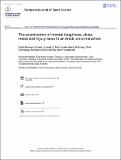Files in this item
The examination of mental toughness, sleep, mood and injury rates in an Arctic ultra-marathon
Item metadata
| dc.contributor.author | Graham, Scott Murray | |
| dc.contributor.author | Martindale, Russell J. J. | |
| dc.contributor.author | McKinley, Mairi | |
| dc.contributor.author | Connaboy, Chris | |
| dc.contributor.author | Andronikos, Georgios | |
| dc.contributor.author | Susmarski, Adam | |
| dc.date.accessioned | 2021-03-10T00:39:56Z | |
| dc.date.available | 2021-03-10T00:39:56Z | |
| dc.date.issued | 2020-03-10 | |
| dc.identifier | 266931236 | |
| dc.identifier | e3cb367e-b3a2-41ad-b638-922d7331a135 | |
| dc.identifier | 85081390364 | |
| dc.identifier | 000519392300001 | |
| dc.identifier.citation | Graham , S M , Martindale , R J J , McKinley , M , Connaboy , C , Andronikos , G & Susmarski , A 2020 , ' The examination of mental toughness, sleep, mood and injury rates in an Arctic ultra-marathon ' , European Journal of Sport Science , vol. Latest Articles . https://doi.org/10.1080/17461391.2020.1733670 | en |
| dc.identifier.issn | 1746-1391 | |
| dc.identifier.other | RIS: urn:749D50767BB4ADB8B56BFE58A2859CA1 | |
| dc.identifier.other | ORCID: /0000-0002-3044-8223/work/77131725 | |
| dc.identifier.uri | https://hdl.handle.net/10023/21579 | |
| dc.description.abstract | There is scarcity of research examining the physiological and psychological effects of ultra-endurance racing on athletes in extreme conditions. The purpose of the current study was to identify common injury patterns and illness, profile mood states and sleep patterns and finally examine the relationships between mental toughness, sleep, mood and injury rates during a 120 mile, three-day Arctic ultra-marathon. Twelve participants (3 females, 9 males) with a mean age of 42 ± 5.35 yrs participated in the study. Mental toughness was measured using the MT18 questionnaire. Injuries were clinically assessed and recorded each day. Temperatures ranged from −20 to −6 degrees Celsius throughout the race. Sleep quantity and mood state were recorded using the BRUMS questionnaire. 10 out of the 12 participants experienced injuries; almost half of the participants had injuries that carried over a number of days. Mean sleep duration over the three days was 4.07 h, with an average of 0.78 injuries per day. Significant changes in mood were recorded across the three days, specifically a reduction in vigour (p = .029) and increase in fatigue (p = .014). Neither sleep quantity nor mental toughness was correlated with injury rate. Interestingly, sleep quantity was not related to changes in mood, as previously shown in ultra-marathons. Mental toughness had a moderate negative correlation (p < 0.01) with depression (−.623), reduced anger (−.616), confusion (−.558), increased vigour (.497) and tension (−.420) during the race. Success in this type of event involves significant psychological and physiological preparation to minimize the effects of sleep deprivation and avoidance of injuries. | |
| dc.format.extent | 7 | |
| dc.format.extent | 611787 | |
| dc.language.iso | eng | |
| dc.relation.ispartof | European Journal of Sport Science | en |
| dc.subject | Endurance | en |
| dc.subject | Environmental physiology | en |
| dc.subject | Fatigue | en |
| dc.subject | Injury and prevention | en |
| dc.subject | Mental toughness | en |
| dc.subject | RC1200 Sports Medicine | en |
| dc.subject | QP Physiology | en |
| dc.subject | DAS | en |
| dc.subject.lcc | RC1200 | en |
| dc.subject.lcc | QP | en |
| dc.title | The examination of mental toughness, sleep, mood and injury rates in an Arctic ultra-marathon | en |
| dc.type | Journal article | en |
| dc.contributor.institution | University of St Andrews. School of Medicine | en |
| dc.contributor.institution | University of St Andrews. Population and Behavioural Science Division | en |
| dc.contributor.institution | University of St Andrews. Education Division | en |
| dc.identifier.doi | 10.1080/17461391.2020.1733670 | |
| dc.description.status | Peer reviewed | en |
| dc.date.embargoedUntil | 2021-03-10 |
This item appears in the following Collection(s)
Items in the St Andrews Research Repository are protected by copyright, with all rights reserved, unless otherwise indicated.

